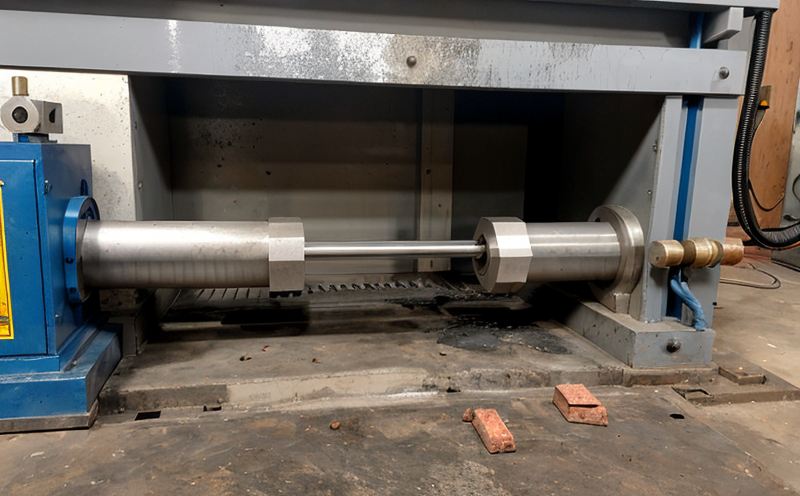EN 10002 Tensile Testing of Metals
The EN 10002 series is a set of European standards that cover mechanical properties testing, including tensile testing, hardness testing, and impact testing. Specifically, EN 10002-1 provides guidance for the determination of tensile strength and elongation at failure in metallic materials. This test method is essential for quality assurance and compliance with regulatory requirements across various industries.
Tensile testing is a fundamental procedure used to assess the mechanical properties of metal specimens under tension until they fail. The primary objective is to evaluate the material's yield stress, ultimate tensile strength (UTS), and elongation at break. These parameters are critical for understanding how materials behave under load and provide crucial insights into their suitability for specific applications.
The test involves subjecting a carefully prepared sample to controlled tension until it reaches its breaking point. The testing machine applies known forces progressively, while sensors monitor the displacement of the specimen. This data is then used to calculate key mechanical properties such as yield strength (proof stress), ultimate tensile strength (UTS), and total elongation at break.
Before conducting this test, specimens need to be prepared according to specific requirements defined in the standard. Proper sample preparation ensures accurate results and reproducibility. This includes ensuring that the specimen has a smooth surface free from defects or irregularities that could affect measurement accuracy.
The testing equipment used for tensile tests typically consists of hydraulic or electromechanical materials testers capable of applying controlled forces up to several thousand Newtons. High-precision load cells measure the force applied during the test, while extensometers track specimen elongation accurately.
After completing the tensile test, detailed reports are generated based on the collected data points. These reports include graphs showing stress-strain relationships and tabulated values for all measured parameters. Compliance with EN 10002-1 ensures that these results meet international standards, enhancing confidence in material performance across different applications.
In summary, EN 10002 Tensile Testing of Metals plays a pivotal role in quality assurance and compliance for various sectors relying on metallic components. By rigorously testing materials according to this standard, manufacturers can ensure that their products meet stringent performance criteria set by industry regulations.
Evaluating yield strength (proof stress)
Determining ultimate tensile strength (UTS)
Measuring total elongation at break
Ensuring accurate sample preparation
Utilizing precise testing equipment
Generating detailed test reports
At Eurolab, we pride ourselves on offering unparalleled expertise and cutting-edge facilities to meet the stringent requirements of EN 10002-1 tensile testing. Our team comprises highly qualified professionals who have extensive experience in performing these tests accurately and reliably.
We provide state-of-the-art equipment tailored specifically for mechanical properties testing, ensuring precise measurements every time. Our laboratories are accredited according to ISO/IEC 17025 standards, guaranteeing the highest level of quality assurance throughout our processes.
Eurolab's commitment to excellence extends beyond just meeting statutory requirements; we also offer comprehensive support services such as training workshops and consultation sessions for clients seeking deeper understanding into their testing procedures. By leveraging our resources, you can rest assured that your products will undergo thorough evaluation ensuring compliance with international standards like EN 10002-1.
Our advanced technology allows us to deliver rapid turnaround times without compromising on accuracy or precision. Whether it's for routine quality checks or complex research projects involving new materials, Eurolab is equipped to handle all your testing needs efficiently and effectively.
International Acceptance and Recognition
The European standard EN 10002-1 has gained widespread acceptance not only within Europe but also internationally. Many countries recognize these standards due to their rigorous development process which involves extensive consultation with stakeholders from academia, industry, and government bodies.
Compliance with this standard demonstrates a commitment to maintaining high-quality products that meet international expectations. Industries ranging from automotive manufacturing to aerospace engineering rely on EN 10002-1 as part of their quality assurance programs because it helps ensure consistent performance across different environments and applications.
By adhering to these globally recognized standards, manufacturers can expand their markets beyond local boundaries into regions where international compliance is crucial for doing business. This includes countries like the United States, Canada, Australia, Japan, South Korea, India, China, Russia, Turkey, Brazil, Mexico, Argentina, and many others.
The standard's global relevance makes it an essential tool for companies operating in diverse markets around the world. It ensures that products meet uniform quality standards regardless of where they are manufactured or sold, fostering trust among customers who value reliability and consistency in their purchasing decisions.
Frequently Asked Questions
Environmental and Sustainability Contributions
Adhering to EN 10002-1 not only ensures high-quality materials but also contributes positively towards sustainability efforts. By ensuring robustness through rigorous testing, industries can reduce waste associated with failures that could occur due to substandard material quality.
Promotes recycling of non-compliant materials
Reduces energy consumption by optimizing design choices based on reliable test results
Minimizes adverse environmental impacts from defective products entering the market
Fosters continuous improvement in manufacturing processes leading to reduced resource use over time
Supports circular economy principles by encouraging reuse and remanufacturing of compliant materials
Encourages responsible sourcing practices ensuring that raw materials are extracted sustainably without harming ecosystems
In conclusion, following EN 10002-1 helps build trust among consumers while promoting environmental responsibility throughout the supply chain.





